 Upon his arrival in Canada, John Paul II was welcomed by a native boy and Polish girl. Upon his arrival in Canada, John Paul II was welcomed by a native boy and Polish girl. |
Twenty five years ago, in 1984, Pope John Paul II became the first Pope to set foot on Canadian soil. It was also the longest pastoral visit ever made by any Pope in a single country — 12 days. When he arrived on September 9 in Quebec City, the Holy Father began a 15,000 kilometre marathon that took him from the Atlantic to the Pacific. When the visit ended on September 20, he had visited Quebec City, Trois-Rivieres, Montreal, St. John’s, Moncton, Halifax, Toronto, Midland, Winnipeg, St. Boniface, Edmonton, Yellowknife, Vancouver and Ottawa-Hull. Here are some excerpts from his prophetic speeches, which are more relevant than ever, since truth is eternal:
 Celebrating Mass in Quebec City Celebrating Mass in Quebec City |
In every generation, living memory makes it possible for us to recognize the presence of Christ, asking as he did at Caesarea: "And you, who do you say I am?" The answer to this question is fundamental for the future of the Church in Canada and for the future of your culture. (...).
Your faith must remain active and strong; it must become always more personal, more and more rooted in prayer and in the experience of the Sacraments; it must reach the living God, in his Son Jesus Christ the Saviour, through the help of the Holy Spirit, in the Church. This is the faith that you ought to deepen with joy, in order to live it and to bear witness to it in daily life and in the new realms of culture. This is indeed the grace which we must request for the future of Quebec, for the future of all Canada.
Let us pray that our generation may have lucid and mature faith, unfailing faith! May this faith be a sharing in the faith of Mary who stood at the foot of her son’s Cross on Calvary.
Was not Mary’s great trial to see her son rejected and condemned to death by the leaders of his people? She persevered to the end. She shared it all. She was united to Jesus who gave his life to save the world... And we, when we feel God is far away, when we do not understand his ways, when the cross hurts our shoulders and our heart, when we suffer for our faith, let us learn from our Mother about steadfastness of faith in every trial, let us learn how to find strength and courage in our unconditional commitment to Jesus Christ. (…)
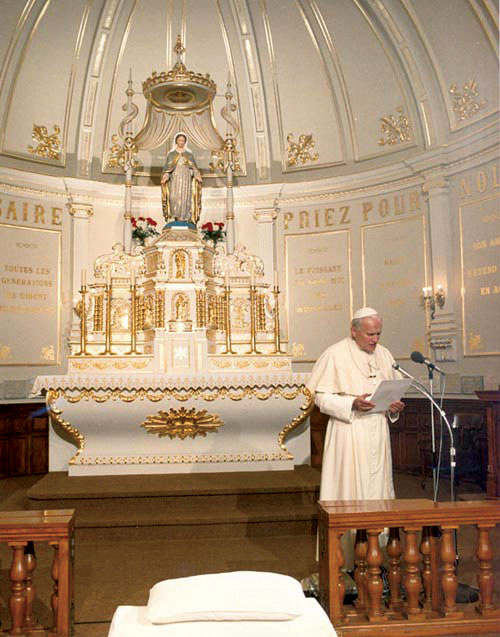
Speaking in the old chapel of the Shrine
The Church meditates on this paschal mystery (of the cross and resurrection) in prayer and, here, the prayer of the rosary takes on its importance. It is with Mary, to the rhythm of the angelic salutation, that we enter the whole mystery of her Son, who was made flesh, died and rose from the dead for us. In a shrine like Notre-Dame-du-Cap, but also in the life of each Christian, each family, this Marian prayer should be like daily breath.
 When we turn to essentials, no Christian, let alone a priest, can be content with silence, or with standing meekly aside on the grounds that ours is a pluralistic society, crossed and recrossed by various currents of thoughts of which many are inspired by scientism, materialism, even atheism. (...) In other words we must, more than ever, see to it that the voice of Christianity has a right to be heard in this country, that it might be freely accepted into the mentality of men and women, that its witness be expressed, at all levels, in convincing fashion, so that the developing culture may at the very least feel challenged by Christian values and take them into account. Christ became man, sacrificed his life and rose from the dead so that his light could shine in the eyes of the world, so that his leaven might cause the bread to rise; incorporated in the dough it must be constantly renewing it, on condition, however, that it retains its quality as leaven.
When we turn to essentials, no Christian, let alone a priest, can be content with silence, or with standing meekly aside on the grounds that ours is a pluralistic society, crossed and recrossed by various currents of thoughts of which many are inspired by scientism, materialism, even atheism. (...) In other words we must, more than ever, see to it that the voice of Christianity has a right to be heard in this country, that it might be freely accepted into the mentality of men and women, that its witness be expressed, at all levels, in convincing fashion, so that the developing culture may at the very least feel challenged by Christian values and take them into account. Christ became man, sacrificed his life and rose from the dead so that his light could shine in the eyes of the world, so that his leaven might cause the bread to rise; incorporated in the dough it must be constantly renewing it, on condition, however, that it retains its quality as leaven.
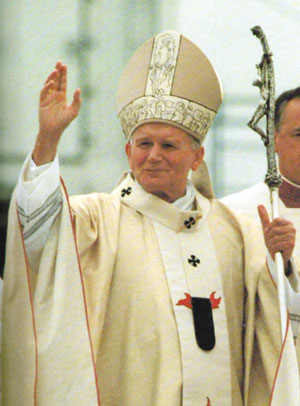 Dear brothers and sisters of Quebec and Canada, what of your meeting with the living God? Sometimes today’s world seems to conceal him, seems to make you forget him. This apparent spiritual desert stands in sharp contrast with a period, not far removed in time, when the presence of God was highly visible here in social life and in the existence of many and varied religious institutions. And you hear repeated around you: "Where is your God?" (Ps 42,4). (…)
Dear brothers and sisters of Quebec and Canada, what of your meeting with the living God? Sometimes today’s world seems to conceal him, seems to make you forget him. This apparent spiritual desert stands in sharp contrast with a period, not far removed in time, when the presence of God was highly visible here in social life and in the existence of many and varied religious institutions. And you hear repeated around you: "Where is your God?" (Ps 42,4). (…)
To replace God is an impossible task. Nothing can fill the emptiness of his absence, neither abundant material wealth — which does not satisfy the heart — nor easy and permissive lifestyles which do not quench our thirst for happiness – nor the exclusive search for success or power for their own sake — nor even technology which makes it possible to change the world but brings no real answer to the mystery of our destiny. All this may prove to be attractive for a time, but it leaves an aftertaste of illusion and a void in the heart (if we have moved away from the burning bush). (…)
Today in this great city of Montreal, we want to praise THE ONE WHO IS. We want to praise him along with all creation, we who exist only because he exists. We exist and we pass away, whereas he alone does not pass away. He alone is Existence itself.
And that is why we say with the Psalm in today’s liturgy: "The Lord is great, loud must be his praise ... give the Lord the glory of his name ... worship the Lord ..." (Ps 95 (96), 4-9) as Moses did when he "covered his face, afraid to look at God" (Ex 3,6).
 Meeting young children at Notre-Dame Basilica Meeting young children at Notre-Dame Basilica |
Prostrate yourselves, men and women of today! You know the mysteries of creation far better than Moses did! Do they no longer speak to you of God? Prostrate yourselves. Read again and read thoroughly the witness of creation!
God is above every creature; he is absolute transcendence. Where the evidence of creation ends, there begins the Word of God, the Word: "In the beginning he was with God ... Through him all things came to be, not one thing had its being but through him ..." (Jn 1, 1-3).
In times of darkness, do not seek an escape. Have the courage to resist the dealers in deception who make capital of your hunger for happiness and who make you pay dearly for a moment of "artificial paradise" — a whiff of smoke, a bout of drinking or drugs. What claims to be a shortcut to happiness leads nowhere. It turns you away from that intelligent self-discipline which builds up the person. Have the courage not to take the easy path; have the courage to reverse directions if you have taken it. And know how to lend a helping hand to those of your companions who are haunted by despair when the darkness of the world is too cruel for them. (…)
 You are often critical, and rightly so, of a society so hungry for consumer goods that it destroys nature and lays waste its resources. But you ask yourselves what value you put on gain, on the possession of riches. Are you free in regard to money? How far are you prepared to share? Remember Jesus the day he went into Zaccheus’ house: his presence transformed an entire life-style; not only did Zaccheus rediscover justice in promising to repay the money he had acquired unjustly, but he also discovers generosity in sharing his wealth.
You are often critical, and rightly so, of a society so hungry for consumer goods that it destroys nature and lays waste its resources. But you ask yourselves what value you put on gain, on the possession of riches. Are you free in regard to money? How far are you prepared to share? Remember Jesus the day he went into Zaccheus’ house: his presence transformed an entire life-style; not only did Zaccheus rediscover justice in promising to repay the money he had acquired unjustly, but he also discovers generosity in sharing his wealth.
Broaden your vision beyond your usual milieu and your own country. Your brothers and sisters in vast regions of the world are without even the necessities of life, wounded in their dignity and oppressed in their freedom and their faith. Christ loves all his own and he identifies lovingly with the poorest. May he share with you his love for all his brothers and sisters! May he help you to live in that true solidarity which crosses frontiers and overcomes prejudices!
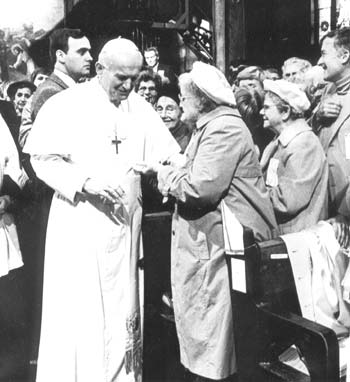 Talking to Pilgrims of St. Michael at the Shrine of the Canadian Martyrs in Midland, Ont., Sept. 15. Talking to Pilgrims of St. Michael at the Shrine of the Canadian Martyrs in Midland, Ont., Sept. 15. |
Canada has been called the breadbasket of the world, and it was one of the world’s largest exporters of fish before the recent recession. It is a cruel paradox that many of you who could be engaged in the production of food are in financial distress here, while at the same time hunger, chronic malnutrition and the threat of starvation afflict millions of people elsewhere in the world.
"I appeal to those in positions of responsibility, and to all involved, to work together to find appropriate solutions to the problems at hand, including a restructuring of the economy, so that human needs be put before mere financial gain."
Technology has contributed so much to the well-being of humanity; it has done so much to uplift the human condition, to serve humanity, and to facilitate and perfect its work. And yet at times technology cannot decide the full measure of its own allegiance: whether it is for humanity or against it. The same technology that has the possibility to help the poor sometimes even contributes to poverty, limits the opportunities for work and removes the possibility of human creativity. In these and other instances technology ceases to be the ally of the human person.
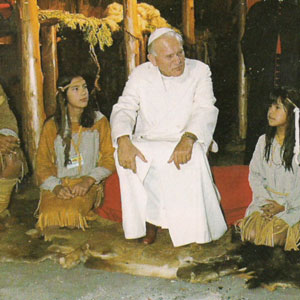 Talking with native people in Midland, Sept. 15 Talking with native people in Midland, Sept. 15 |
For this reason my appeal goes to all concerned: to you, labour leaders; to you, business leaders; to you, scientists; to you, political leaders; to everyone who can make a contribution toward ensuring that the technology which has done so much to build Toronto and all Canada will truly serve man, woman and child throughout this land.
We have listened today to the Gospel about the final judgment with the same emotion as always. This passage touches some of the most fundamental questions of our faith and morality. These two fields are strictly linked to each other. Perhaps no other passage in the Gospel speaks of their relationship in such a convincing way. (…)
I was hungry... I was thirsty... I was a stranger... naked... sick... in prison..." (Mt 25:35-36). And those called to judgment — on his right hand and on his left — will ask: When and where? When and where have we seen you like this? When and where have we done what you said? Or: When and where have we not done it?
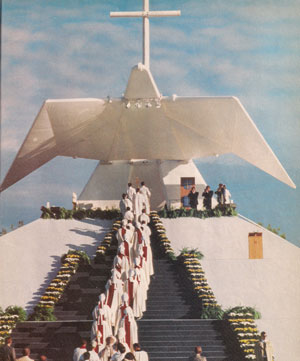 In Edmonton, the mass site was in the form of a dove. In Edmonton, the mass site was in the form of a dove. |
The answer: "Truly, I say to you, as you did it to one of the least of these my brethren, you did it to me" (Mt 25:40). And, on the contrary: "As you did it not to one of the least of these, you did it not to me" (Mt 25:45).
"To one of the least of these my brethren". Thus: to man, to an individual human being in need.
Yet, the Second Vatican Council, following the whole of Tradition, warns us not to stop at an "individualistic" interpretation of Christian ethics, since Christian ethics also has its social dimension. The human person lives in a community, in society. And with the community he shares hunger and thirst and sickness and malnutrition and misery and all the deficiencies that result therefrom. In his or her own person the human being is meant to experience the needs of others.
So it is that Christ the Judge speaks of "one of the least of the brethren", and at the same time he is speaking of each and of all. Yes. He is speaking of the whole universal dimension of injustice and evil. He is speaking of what today we are accustomed to call the North-South contrast. Hence not only East-West, but also North-South: the increasingly wealthier North, and the increasingly poorer South.
Yes, the South — becoming always poorer; and the North — becoming always richer. Richer too in the resources of weapons with which the superpowers and blocs can mutually threaten each other. And they threaten each other — such an argument also exists — in order not to destroy each other. (...)
Nevertheless, in the light of Christ’s words, this poor South will judge the rich North. And the poor people and poor nations — poor in different ways, not only lacking food, but also deprived of freedom and other human rights — will judge those people who take these goods away from them, amassing to themselves the imperialistic monopoly of economic and political supremacy at the expense of others. (…)
May justice and peace embrace (cf. Ps 84(85):10) once again at the end of the second millennium which prepares us for the coming of Christ, in glory. Amen.
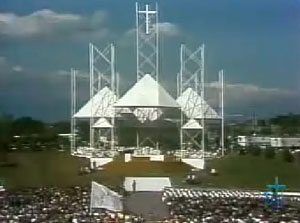 In front of the altar of the papal mass in Ottawa, the white flag of the Pilgrims of St. Michael. In front of the altar of the papal mass in Ottawa, the white flag of the Pilgrims of St. Michael. |
To build peace we must establish justice. What moral conscience could resign itself, without reacting, when there exist "frightful disparities between excessively rich individuals and groups on the one hand, and on the other hand the majority made up of the poor or indeed of the destitute..."?
In a word, what does the Gospel of the Eight Beatitudes proclaim? It says that the poor in spirit, the gentle, the merciful, those who hunger and thirst for justice, the peacemakers — all these are invincible! It says that the final victory belongs to them! To them belongs the Kingdom of Truth, of Justice, of Love and of Peace!
 In this special issue of the journal, MICHAEL, the reader will discover who are the true rulers of the world. We discuss that the current monetary system is a mechanism to control populations. The reader will come to understand that "crises" are created and that when governments attempt to get out of the grip of financial tyranny wars are waged.
In this special issue of the journal, MICHAEL, the reader will discover who are the true rulers of the world. We discuss that the current monetary system is a mechanism to control populations. The reader will come to understand that "crises" are created and that when governments attempt to get out of the grip of financial tyranny wars are waged. An Efficient Financial System, written by Louis Even, is for the reader who has some understanding of the Douglas Social Credit monetary reform principles. Technical aspects and applications are discussed in short chapters dedicated to the three propositions, how equilibrium between prices and purchasing power can be achieved, the financing of private and public production, how a Social Dividend would be financed, and, finally, what would become of taxes under a Douglas Social Credit economy. Study this publication to better grasp the practical application of Douglas' work.
An Efficient Financial System, written by Louis Even, is for the reader who has some understanding of the Douglas Social Credit monetary reform principles. Technical aspects and applications are discussed in short chapters dedicated to the three propositions, how equilibrium between prices and purchasing power can be achieved, the financing of private and public production, how a Social Dividend would be financed, and, finally, what would become of taxes under a Douglas Social Credit economy. Study this publication to better grasp the practical application of Douglas' work.  Reflections of African bishops and priests after our weeks of study in Rougemont, Canada, on Economic Democracy, 2008-2018
Reflections of African bishops and priests after our weeks of study in Rougemont, Canada, on Economic Democracy, 2008-2018 The Social Dividend is one of three principles that comprise the Social Credit monetary reform which is the topic of this booklet. The Social Dividend is an income granted to each citizen from cradle to grave, with- out condition, regardless of employment status.
The Social Dividend is one of three principles that comprise the Social Credit monetary reform which is the topic of this booklet. The Social Dividend is an income granted to each citizen from cradle to grave, with- out condition, regardless of employment status.Rougemont Quebec Monthly Meetings
Every 4th Sunday of every month, a monthly meeting is held in Rougemont.
Comments (3)
Patrick Pearl
I'm censored on fascistbook constantly in in the middle of a 30 day Ban for sharing a meme. Just days after getting off a 30 day Ban. For sharing a meme.
What are they afraid of.
This is communism no other words. The USA election stolen right before our eyes. Through the Vatican and Italy main stream media covers it.
Why aren't North America's
reply
Patrick Pearl
The crowd huddled under a big plastic tarp.
Then the Pope finally arrived just as my toes went numb and then gave his whole speech in another language of languages.
I was disappointed.
Didn't get much from the words spoken but the crowd was kind and sharing.
It's unfortunate that the current Pope is such s monster it has it always been that way. That would explain all the PEDOPHILE in Ministry.
The Pope openly says they worshipp Lucifer him and the Vatican Cardinals and Bishops.
There's video evidence of them on YouTube doing Easter mass to Lucifer
Currently the Pope is attempting to create s new one world religion called Chrislam. Joining Catholicism with Islam mormanism and Buddhism together.
No joke
Currently poor says Jesus is son of Lucifer.
People need to research
YESHUA set us free as s gift from Lucifer and these people want to put us back under noahide laws.
Yhwh is Lucifer
John 1:1-3
John 5:45
John 3:16-17
John 8:44-56
John 5:37
John 14:6
Romans 10:4
Galatians 5:4
Galatians 2:16
Christ is the only way.
reply
Patrick Pearl
Matthew 27:50-53
reply